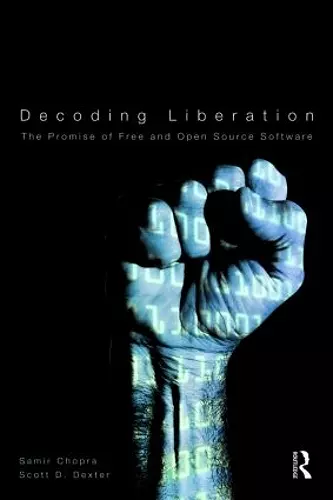Decoding Liberation
The Promise of Free and Open Source Software
Samir Chopra author Scott D Dexter author
Format:Paperback
Publisher:Taylor & Francis Ltd
Published:9th Nov '09
Currently unavailable, and unfortunately no date known when it will be back
This paperback is available in another edition too:
- Hardback£145.00(9780415978934)

This insightful book explores the connection between free software and freedom, examining its impact on technology and society. Decoding Liberation is a must-read for enthusiasts.
This book delves into the intricate relationship between the free software movement and the concept of freedom. It examines five key themes: the emancipatory potential of technology, social liberties, the facilitation of creativity, the objectivity of computing as a scientific practice, and the role of software in a cyborg world. Through these lenses, the authors pose critical questions about the freedoms inherent in free software and how they manifest in society.
Decoding Liberation emphasizes that software is not merely a set of instructions for computers. Rather, it plays a vital role in shaping political imperatives and policies. The free software movement embodies the potential for significant social and political change, making the knowledge and innovations of its creators accessible to the public. This principle is encapsulated in the movement's famous slogan, Think free speech, not free beer, which highlights the foundational aspects of free software, such as the Linux phenomenon.
The book provides a comprehensive perspective on how free software relates to broader concepts of freedom. By exploring the themes of creativity, social liberties, and the scientific objectivity of computing, Decoding Liberation serves as an essential resource for anyone interested in understanding how the free software movement can transform both technology and society at large.
As Open Source software continues its successful penetration of mainstream business practice and economic thought, we’re at risk of losing sight of a critical part of what Richard Stallman meant when he said the ‘free’ part of free software is like free speech, not free beer. In Decoding Liberalism, Samir Chopra and Scott Dexter recapture and extend a part of the conversation that will ultimately be much more important than business models, patent and copyright law, or total cost of ownership for a piece of software. What does the open source model offer to political, artistic, and scientific freedom, and thus to the human enterprise of creativity beyond the guts of a computing machine? Their book is an eloquent, thoughtful, adventurous, and exciting dive into what really matters about changing the rules of code.—Steven Weber, author of The Success of Open Source
An exceptionally well-written and conceptualized work on an underexplored area of computer science. Summing Up: Highly recommended.—Choice
[A] unique, important, and sympathetic examination…Decoding Liberation unpacks the history, ethics, political economy, and aesthetic practice of free software production. Chopra and Dexter examine FOSS as a philosophically inspired social movement built by hackers and wrought through the creation of technology. There is a philosophy and politics to all technology, as the authors repeatedly point out, but FOSS practice makes these more explicit and more visible in ways that make it an ideal target for their interdisciplinary analysis. A technologically grounded and philosophical evaluation of technical practice and artifacts, Chopra and Dexter’s approach is an effective and deeply appropriate fit for FOSS.—Minds and Machines
This would be a very useful text for students looking to cover the literature on FLOSS, particularly those from a science background who wish to know more about the social and philosophical side of software development.—Theory, Culture & Society
It is the rare work in this space that I can recommend equally to the novice and expert, but Decoding Liberation is one. Additionally, individuals from a broad range of disciplines will be able to find something that resonates here. This is perhaps the work's chief value: because it is accessible to so many, it has the potential to spur further discussion on these issues in a way that many works could never expect. Decoding Liberation is a remarkable collaboration that invites further debate.—Resource Center for Cyberculture Studies
As the first sustained philosophical treatment of the Free and Open Source Software movements, Decoding Liberation achieves one thing for certain. By covering broad areas of the philosophical landscape—political philosophy, aesthetics, ethics, and philosophy of science—Chopra and Dexter have shown the range of FOSS issues that can be informed by philosophy. In opting to paint with a broad brush, they have, I believe, opened many spaces for critical dialog.—APA Newsletter on Philosophy and Computers
[A] unique, important, and sympathetic examination....Decoding Liberation unpacks the history, ethics, political economy, and aesthetic practice of free software production. … A technologically grounded and philosophical evaluation of technical practice and artifacts, Chopra and Dexter’s approach is an effective and deeply appropriate fit for FOSS.—Minds and Machines
This would be a very useful text for students looking to cover the literature on FLOSS, particularly those from a science background who wish to know more about the social and philosophical side of software development.—Theory, Culture & Society
It is the rare work in this space that I can recommend equally to the novice and expert, but Decoding Liberation is one. …[B]ecause it is accessible to so many, it has the potential to spur further discussion on these issues in a way that many works could never expect. Decoding Liberation is a remarkable collaboration that invites further debate.—Resource Center for Cyberculture Studies
ISBN: 9780415876780
Dimensions: unknown
Weight: 317g
214 pages